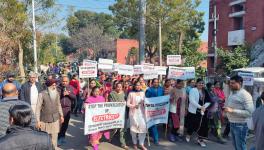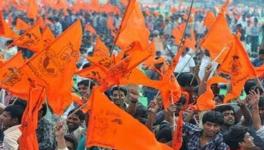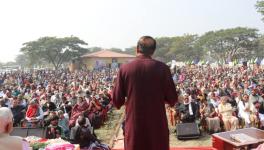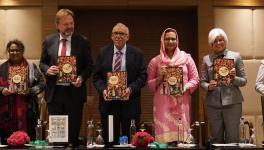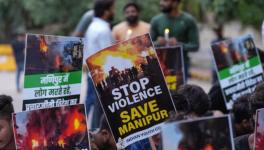Hope is a Force, Even in our Darkest Hour
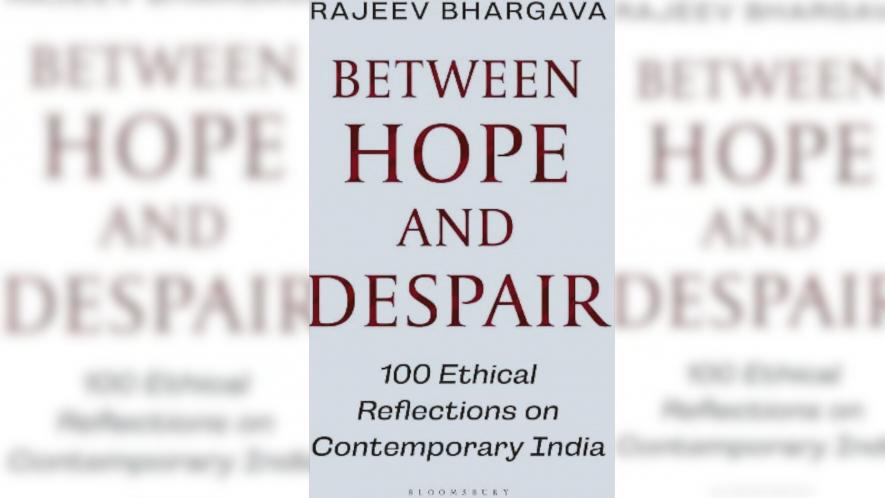
Image Courtesy: Amazon.in
Prof Rajeev Bhargava’s book, Between Hope and Despair: 100 Ethical Reflections on Contemporary India, published by Bloomsbury, 2022, reflects on the predicaments plaguing Indian democracy. The book weaves together a collection of insightful essays first published in The Hindu newspaper as a weekly segment.
The 100 essays are thematically divided into ten parts. He explores comprehensive arguments in each section, offering a panoramic view of the intricacies that define our pluralist state in the modern era. He dissects the essence of our collective dreams, forging a path towards a deeper understanding of the ethos that shapes our evolving democracy.
Prof Bhargava introduces the book by compelling the readers to face a sobering truth—“India’s collective ethical identity is currently under duress”. This allegation of a pluralist state engulfed in duress underscores the encroachment of populism, with its tightening grip on society leading to the erosion of the constitutional commitments set on the grandiose for social transformation. The author argues for rationalising public culture to try and prevent this erosion.
In the first part, Bhargava addresses India’s innate identity. Elucidating what a nation is, he writes that the nation is a “self-conscious awareness of commonality” among the people. A public culture that is endured by dialogue emanating from media on common concerns of the masses. Drawing from French philosopher and playwright Jean-Paul Sartre’s insights, he highlights that intellectuals possess a trait of engaging in various matters, making anyone's interests a subject of common concern in the context of modern democracies. “If any nation is a people in conversation, then anyone stopping this conversation is damaging it,” he writes. Attempts to stifle the open dialogue are concerning, especially the mainstream media evading these concerns and seemingly working as partisan media or at the behest of their political masters.
In the ever-evolving journey of the transformative Constitution, Prof Bhargava highlights its dynamic nature moulded after due deliberation. For instance, ‘democratic’ and ‘republic’ were added to the Preamble since an undemocratic republican was conceivable. In this context, the apex court recently found an aberration in the republican spirit of the Constitution. The paradox of the right to vote despite being the cornerstone of democracy still being a ‘mere’ statutory right.
A narrative from the Hindutva perspective has made the audacious claim that our Constitution is inherently anti-Hindu for bringing reforms in Hindu personal laws. Bhargava employs an evocative analogy and counters the notion that state intervention has been unjust to Hinduism. He writes this is akin to a patient resenting the other for needing surgery they haven't been fortunate to receive. He goes on to label such beliefs as “absurd” and emphasises the 1956 reform as a means to save Hinduism from “decay”.
A more distorting narrative around the issue has emerged as Bibek Debroy, the Prime Minister’s economic advisor, takes a critical stance on the Constitution’s colonial origins. The revered economist penning such thoughts had overlooked that the political, social and cultural rights make the draft an indigenous one.
Also, setting up a narrative such as the ‘case for ‘we the people’ to embrace a new Constitution’ is dangerous. Especially when, he writes, “The 1973 judgement [in the Kesavananda Bharati case, which propounded the basic structure doctrine,] applies to amendments to the existing Constitution, not a fresh one”. Likewise, if at all in the special session of the Parliament, a Constitutional Amendment is moved to omit ‘India’ from the Constitution, it would emanate from a similar line of thought.
Prof Bhargava’s scholarly work on secularism has left an indelible mark. The fourth part of the book, ‘Our Religious and Secular Ideals’, navigates the intricate web of contemporary debates swirling religiosity and secular values. He elucidates the role of secularism in liberal democracies as many find liberal democracies sufficient in combating all forms of discrimination.
However, he argues that the approach, if not wrong, is insufficient. He argues that secularism is the antidote to the perils of ‘religious fanaticism’, ‘intra-religious oppression’ and ‘domination of one religion by another’, aligning it with the visionary ideals of our forefathers. The inaugural chapter of this section pays homage to one such founding figure, Mahatma Gandhi and his vision of public religiosity: “The soul of religion is one, but encased in a multitude of forms. Wise men will ignore the outward crust and see the same soul living under a variety of crusts.”
In a striking resonance with the book’s overarching theme of hope and despair, Professor Bhargava unveils despondency in the contemporary world in the sixth part “owning up to injustices and grave wrongdoings”. He addresses the pervasive despondence stemming from the pervasive spectre of injustice, both on a grand scale and at the deeply personal, individual level.
Marginalised communities endure deep structural humiliation, which is often ignored in the backdrop of societal complacency. The insidious nature of the issue has led to a distressing normalisation of such injustice. He points, as an example, towards the archaic belief held by religious conservatives that menstrual cycles are somehow polluting.
He adds that the ‘wilful humiliation’ of marginalised communities also occurs: when ‘the victim abjectly surrenders to the will of the perpetrator’. Such an act of humiliation, he writes, is “not only to disempower people but to ensure that the humiliating act is stamped forever and to render the resulting debasement vivid to them with the sole purpose of satisfying the humiliator”.
Concurrently, in India, the precarious existence of the Dalits, even within urban landscapes, remains a stark reality as they grapple with persecution and humiliation stemming from the persisting conservative tenets of Brahmanism.
Amidst the shadows of despair that often loom large Prof Bhargava extends a glimmer of hope as he draws the curtain. In the tenth part of the book, ‘Hope in Times of Despair’, he employs succinct storytelling, crafting allegorical narratives from his personal experiences.
Whether recounting a chance encounter in Sydney with a taxi driver from Karachi or sharing a five-point list outlining expectations from the government, the fundamental pillars for Bhargava’s wishes are that the government must uphold the rule of law, craft policies that embrace and uplift the marginalised, safeguard the autonomy of institutions, foster a culture of tolerance for constructive criticism, and cherish and preserve our rich cultural heritage.
Indeed, the pages of his book not only reflect the pressing challenges we face but also shine a guiding light, reminding us that even in our darkest hours, hope remains an enduring force.
The author is a lawyer practising in Delhi. The views are personal.
Get the latest reports & analysis with people's perspective on Protests, movements & deep analytical videos, discussions of the current affairs in your Telegram app. Subscribe to NewsClick's Telegram channel & get Real-Time updates on stories, as they get published on our website.










